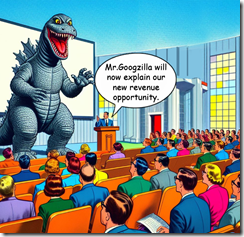Google: Lost in Its Own AI Maze
May 31, 2024
 This essay is the work of a dinobaby. Unlike some folks, no smart software improved my native ineptness.
This essay is the work of a dinobaby. Unlike some folks, no smart software improved my native ineptness.
One “real” news items caught my attention this morning. Let me tell you. Even with the interesting activities in the Manhattan court, these jumped at me. Let’s take a quick look and see if Googzilla (see illustration) can make a successful exit from the AI maze in which the online advertising giant finds itself.
Googzilla is lost in its own AI maze. Can it find a way out? Thanks, MSFT Copilot. Three tries and I got a lizard in a maze. Keep allocating compute cycles to security because obviously Copilot is getting fewer and fewer these days.
“Google Pins Blame on Data Voids for Bad AI Overviews, Will Rein Them In” makes it clear that Google is not blaming itself for some of the wacky outputs its centerpiece AI function has been delivering. I won’t do the guilty-34-times thing. I will just mention the non-toxic glue and pizza item. This news story reports:
Google thinks the AI Overviews for its search engine are great, and is blaming viral screenshots of bizarre results on "data voids" while claiming some of the other responses are actually fake. In a Thursday post, Google VP and Head of Google Search Liz Reid doubles down on the tech giant’s argument that AI Overviews make Google searches better overall—but also admits that there are some situations where the company "didn’t get it right."
So let’s look at that Google blog post titled “AI Overviews: About Last Week.”
How about this statement?
User feedback shows that with AI Overviews, people have higher satisfaction with their search results, and they’re asking longer, more complex questions that they know Google can now help with. They use AI Overviews as a jumping off point to visit web content, and we see that the clicks to webpages are higher quality — people are more likely to stay on that page, because we’ve done a better job of finding the right info and helpful webpages for them.
The statement strikes me as something that a character would say in an episode of the Twilight Zone, a TV series in the 50s and 60s. The TV show had a weird theme, and I thought I heard it playing when I read the official Googley blog post. Is this the Google “bullseye” method or a bullsh*t method?
The official Googley blog post notes:
This means that AI Overviews generally don’t “hallucinate” or make things up in the ways that other LLM products might. When AI Overviews get it wrong, it’s usually for other reasons: misinterpreting queries, misinterpreting a nuance of language on the web, or not having a lot of great information available. (These are challenges that occur with other Search features too.) This approach is highly effective. Overall, our tests show that our accuracy rate for AI Overviews is on par with another popular feature in Search — featured snippets — which also uses AI systems to identify and show key info with links to web content.
Okay, we are into bullsh*t method. Google search is now a key moment in the Sundar & Prabhakar Comedy Act. Since the début in Paris which featured incorrect data, the Google has been in Code Red or Red Alert of red faced-embarrassment mode. Now the company wants people to eat rocks, and it is not the online advertising giant’s fault. The blog post explains:
There isn’t much web content that seriously contemplates that question, either. This is what is often called a “data void” or “information gap,” where there’s a limited amount of high quality content about a topic. However, in this case, there is satirical content on this topic … that also happened to be republished on a geological software provider’s website. So when someone put that question into Search, an AI Overview appeared that faithfully linked to one of the only websites that tackled the question. In other examples, we saw AI Overviews that featured sarcastic or troll-y content from discussion forums. Forums are often a great source of authentic, first-hand information, but in some cases can lead to less-than-helpful advice, like using glue to get cheese to stick to pizza.
Okay, I think one component of the bullsh*t method is that it is not Google’s fault. “Users” — not customers because Google has advertising clients, partners, and some lobbyists. Everyone else is a user, and it is users’ fault, the data creators’ fault, and probably Sam AI-Man’s fault. (Did I omit anyone on whom to blame the let them “eat rocks” result?)
And the Google cares. This passage is worthy of a Hallmark card with a foldout:
At the scale of the web, with billions of queries coming in every day, there are bound to be some oddities and errors. We’ve learned a lot over the past 25 years about how to build and maintain a high-quality search experience, including how to learn from these errors to make Search better for everyone. We’ll keep improving when and how we show AI Overviews and strengthening our protections, including for edge cases, and we’re very grateful for the ongoing feedback.
What’s my take on this?
- The assumption that Google search is “good” is interesting, just not in line with what I hear, read, and experience when I do use Google. Note: That my personal usage has decreased over time.
- Google is trying to explain away its obvious flaws. The Google speak may work for some people, just not for me.
- The tone is that of a entitled seventh-grader from a wealthy family, not the type of language I find particularly helpful when the “smart” Google software has to be remediated by humans. Google is terminating humans, right? Now Google needs humans. What’s up Google?
Net net: Google is snagged it ins own AI maze. I am growing less confident in the company’s ability to extricate itself. The Sam AI-Man has crafted deals with two outfits big enough to make Google’s life more interesting. Google’s own management seems ineffectual despite the flashing red and yellow lights and the honking of alarms. Google’s wordsmiths and lawyers are running out of verbal wiggle room. But most important, the failure of the bullseye method and the oozing comfort of the bullsh*it method marks a turning point for the company.
Stephen E Arnold, May 31, 2024
NSO Group: Making Headlines Again and Again and Again
May 31, 2024
 This essay is the work of a dinobaby. Unlike some folks, no smart software improved my native ineptness.
This essay is the work of a dinobaby. Unlike some folks, no smart software improved my native ineptness.
NSO Group continues to generate news. One example is the company’s flagship sponsorship of an interesting conference going on in Prague from June 4th to the 6th. What’s interesting mean? I think those who attend the conference are engaged in information-related activities connected in some way to law enforcement and intelligence. How do I know NSO Group ponied up big bucks to be the “lead sponsor”? Easy. I saw this advertisement on the conference organizer’s Web site. I know you want me to reveal the url, but I will treat the organizer in a professional manner. Just use those Google Dorks, and you will locate the event. The ad:
What’s the ad from the “lead sponsor” say? Here are a few snippets from the marketing arm of NSO Group:
NSO Group develops and provides state-of-the-art solutions, designed to assist in preventing terrorism and crime. Our solutions address diverse strategical, tactical and operational needs and scenarios to serve authorized government agencies including intelligence, military and law enforcement. Developed by the top technology and data science experts, the NSO portfolio includes cyber intelligence, network and homeland security solutions. NSO Group is proud to help to protect lives, security and personal safety of citizens around the world.
Innocent stuff with a flavor jargon-loving Madison Avenue types prefer.
Citizen’s Lab is a bit like mules in an old-fashioned grist mill. The researchers do not change what they think about. Source: Royal Mint Museum in the UK.
Just for some fun, let’s look at the NSO Group through a different lens. The UK newspaper The Guardian, which counts how many stories I look at a year, published “Critics of Putin and His Allies Targeted with Spyware Inside the EU.” Here’s a sample of the story’s view of NSO Group:
At least seven journalists and activists who have been vocal critics of the Kremlin and its allies have been targeted inside the EU by a state using Pegasus, the hacking spyware made by Israel’s NSO Group, according to a new report by security researchers. The targets of the hacking attempts – who were first alerted to the attempted cyber-intrusions after receiving threat notifications from Apple on their iPhones – include Russian, Belarusian, Latvian and Israeli journalists and activists inside the EU.
And who wrote the report?
Access Now, the Citizen Lab at the Munk School of Global Affairs & Public Policy at the University of Toronto (“the Citizen Lab”), and independent digital security expert Nikolai Kvantiliani
The Citizen Lab has been paying attention to NSO Group for years. The people surveilled or spied upon via the NSO Group’s Pegasus technology are anti-Russia; that is, none of the entities will be invited to a picnic at Mr. Putin’s estate near Sochi.
Obviously some outfit has access to the Pegasus software and its command-and-control system. It is unlikely that NSO Group provided the software free of charge. Therefore, one can conclude that NSO Group could reveal what country was using its software for purposes one might consider outside the bounds of the write up’s words cited above.
NSO Group remains one of the — if not the main — poster children for specialized software. The company continues to make headlines. Its technology remains one of the leaders in the type of software which can be used to obtain information for a mobile device. There are some alternatives, but NSO Group remains the Big Dog.
One wonders why Israel, presumably with the Pegasus tool, could not have obtained information relevant to the attack in October 2023. My personal view is that having Fancy Dan ways to get data from a mobile phone, human analysts have to figure out what’s important and what to identify as significant.
My point is that the hoo-hah about NSO Group and Pegasus may not be warranted. Information without the trained analysts and downstream software may have difficulty getting the information required to take a specific action. Israel’s lack of intelligence means that software alone can’t do the job. No matter what the marketing material says or how slick the slide deck used to brief those with a “need to know” appears — software is not intelligence.
Will NSO Group continue to make headlines? Probably. Those with access to Pegasus will make errors and disclose their ineptness. Citizen’s Lab will be at the ready. New reports will be forthcoming.
Net net: Is anyone surprised Mr. Putin is trying to monitor anti-Russia voices? Is Pegasus the only software pressed into service? My answer to this question is: “Mr. Putin will use whatever tool he can to achieve his objectives.” Perhaps Citizen’s Lab should look for other specialized software and expand its opportunities to write reports? When will Apple address the vulnerability which NSO Group continues to exploit?
Stephen E Arnold, May 31, 2024
In the AI Race, Is Google Able to Win a Sprint to a Feature?
May 31, 2024
 This essay is the work of a dinobaby. Unlike some folks, no smart software improved my native ineptness.
This essay is the work of a dinobaby. Unlike some folks, no smart software improved my native ineptness.
One would think that a sophisticated company with cash and skilled employees would avoid a mistake like shooting the CEO in the foot. The mishap has occurred again, and if it were captured in a TikTok, it would make an outstanding trailer for the Sundar & Prabhakar reprise of The Greatest Marketing Mistakes of the Year.
At age 25, which is quite the mileage when traveling on the Information Superhighway, the old timer is finding out that younger, speedier outfits may win a number of AI races. In the illustration, the Google runner seems stressed at the start of the race. Will the geezer win? Thanks, MidJourney. Good enough, which is the benchmark today I fear.
“Google Is Taking ‘Swift Action’ to Remove Inaccurate AI Overview Responses” explains that Google rolled out with some fanfare its AI Overviews. The idea is that smart software would just provide the “user” of the Google ad delivery machine with an answer to a query. Some people have found that the outputs are crazier than one would expect from a Big Tech outfit. The article states:
… Google says, “The vast majority of AI Overviews provide high-quality information, with links to dig deeper on the web. Many of the examples we’ve seen have been uncommon queries, and we’ve also seen examples that were doctored or that we couldn’t reproduce. “We conducted extensive testing before launching this new experience, and as with other features we’ve launched in Search, we appreciate the feedback,” Google adds. “We’re taking swift action where appropriate under our content policies, and using these examples to develop broader improvements to our systems, some of which have already started to roll out.”
But others are much kinder. One notable example is Mashable’s “We Gave Google’s AI Overviews the Benefit of the Doubt. Here’s How They Did.” This estimable publication reported:
Were there weird hallucinations? Yes. Did they work just fine sometimes? Also yes.
The write up noted:
AI Overviews were a little worse in most of my test cases, but sometimes they were perfectly fine, and obviously you get them very fast, which is nice. The AI hallucinations I experienced weren’t going to steer me toward any danger.
Let’s step back and view the situation via several observations:
- Google’s big moment becomes a meme cemented to glue on pizza
- Does Google have a quality control process which flags obvious gaffes? Apparently not.
- Google management seems to suggest that humans have to intervene in a Google “smart” process. Doesn’t that defeat the purpose of using smart software to replace some humans?
Net net: The Google is ageing, and I am not sure a singularity will offset these quite obvious effects of ageing, slowed corporate processes, and stuttering synapses in the revamped AI unit.
Stephen E Arnold, May 31, 2024
Amazon: Competition Heats Up in Some Carpetland Offices
May 31, 2024
 This essay is the work of a dinobaby. Unlike some folks, no smart software improved my native ineptness.
This essay is the work of a dinobaby. Unlike some folks, no smart software improved my native ineptness.
The tech industry is cutthroat and no one is safe in their position, no matter how high they are on the food chain. The Verge explains how one of Amazon’s CEOs might not be able to withstand competition: “Amazon Web Services CEO To Step Down.” Adam Selipsky is the acting CEO of Amazon Web Services and he will be stepping down June 3, 2024. He will be replaced by Matt Garman, who is currently the SVP of AWS sales, marketing, and global services. Garman has worked at Amazon for eighteen years in the AWS division.
AWS is responsible for 17% of Amazon’s total revenue and 6% of its operating income in the first quarter of 2024. AWS is known as an “invisible server empire” because it hosts the infrastructures of many organizations across all industries. When AWS experienced outages, there were ripple effects on the Internet and real world, i.e., Amazon delivery vans and warehouse bots couldn’t work. AWS is a big player in Amazon’s AI development: proprietary AI chips, Anthropic, Amazon Q, Amazon Bedrock, and Nvidia’s GH200 chips. Selipsky was a major leader in building Amazon’s AI foundations.
Andy Jassy wrote an email to AWS staff about the transfer of power that applauds Selipsky’s service, explains he’s moving onto another “challenge,” and is taking a “well-deserved respite.” The email then moves onto congratulating German. Selipsky replied with the following:
“Leading this amazing team and the AWS business is a big job, and I’m proud of all we’ve accomplished going from a start-up to where we are today. In the back of my head I thought there might be another chapter down the road at some point, but I never wanted to distract myself from what we are all working so hard to achieve. Given the state of the business and the leadership team, now is an appropriate moment for me to make this transition, and to take the opportunity to spend more time with family for a while, recharge a bit, and create some mental free space to reflect and consider the possibilities.
Matt and the AWS leadership team are ready for this next big opportunity. I’m excited to see what they and you do next, because I know it will be impressive. The future is bright for AWS (and for Amazon). I wish you all the very best of luck on this adventure.”
Selipsky, Jassy, Garman, and the AWS appear to be leaving on good terms. There might be something that happened behind closed doors and the verbiage indicates Selipsky can’t handle where AWS is going.
Whitney Grace, May 31, 2024
A Different View of That Google Search Leak
May 30, 2024
 This essay is the work of a dinobaby. Unlike some folks, no smart software improved my native ineptness.
This essay is the work of a dinobaby. Unlike some folks, no smart software improved my native ineptness.
As a dinobaby, I can make observations that a person with two young children and a mortgage are not comfortable making. So buckle your seat belt and grab a couple of Prilosec. I don’t think the leak is a big deal. Let me provide some color.
This cartoon requires that you examine the information in “Authorities: Google Exec Died on Yacht after Upscale Prostitute Injected Him with Heroin.” The incident provides some insight into the ethical compass of one Google officer. Do others share that directionality? Thanks, MSFT Copilot. You unwittingly produced a good cartoon. Ho ho ho.
Many comments are zipping around about the thousands of pages of Google secret information are flying around. The “legend” of the leak is that Search API information became available. The “spark” which lit the current Google fire was this post: “An Anonymous Source Shared Thousands of Leaked Google Search API Documents with Me; Everyone in SEO Should See Them.” (FYI: The leaker is an entity using the handle “Erfan Azimi.”)
That write up says:
This documentation doesn’t show things like the weight of particular elements in the search ranking algorithm, nor does it prove which elements are used in the ranking systems. But, it does show incredible details about data Google collects.
If you want more of this SEO stuff, have at it. I think the information is almost useless. Do Googler’s follow procedures? Think about your answer for a company that operates essentially without meaningful controls. Here’s my view which means it is time to gulp those tabs.
First, the entire SEO game helps Google sell online advertising. Once the SEO push fails to return results to the client of the SEO expert, Google allows these experts to push Google ads on their customer. Why? Pay Google money and the advertiser will get traffic. How does this work? Well, money talks, and Google search experts deliver clicks.
Second, the core of Google is now surrounded by wrappers. The thousands of words in the leak record the stuff essentially unmanaged Googlers do to fill time. After 25 years, the old ideas (some of which were derived from the CLEVER method for which Jon Kleinberg deserves credit.) have been like a pretty good organic chicken swathed in hundreds of layers of increasingly crappy plastic wrap. With the appropriate source of illumination, one can discern the chicken beneath the halogenated wrap, but the chicken looks darned awful. Do you want to eat the chicken? Answer: Probably no more than I want to eat a pizza with non-toxic glue in the cheese.
Third, the senior management of the Google is divorced from the old-fashioned idea of typing a couple of words and getting results which are supposed to be germane to the query. When Boolean logic was part of the search game, search was about 60 percent effective. Thus, it seemed logical over the years to provide training wheels and expand the query against which ads could be sold. Now the game is just to sell ads because the query is relaxed, extended, and mostly useless except for a narrow class of search strings. (Use Google dorks and get some useful stuff.)
Okay, what are the implications of these three observations? Grab another Prilosec, please.
First, Google has to make more and more money because its costs are quite difficult to control. With cost control out of reach, the company’s “leadership” must focus on extracting cash from “users.” (Customers is not the right word for those in the Google datasphere.) The CFO is looking for her future elsewhere. The key point is that her future is not at the Google, its black maw hungry for cash, and the costs of keeping the lights on. Burn rate is not a problem just for start ups, folks.
Second, Google’s senior management is not focused on search no matter what the PR says. The company’s senior leader is a consultant, a smooth talking wordsmith, and a neutral personality to the outside world. As a result, the problems of software wrappers and even the incredible missteps with smart software are faint sounds coming from the other side of a sound-proofed room in a crazy college dormitory. Consultants consult. That’s what Google’s management team does. The “officers” have to figure out how to implement. Then those who do the work find themselves in a cloud of confusion. I did a blog essay about one of Google’s odd ball methods for delivering “minimum viable products”. The process has a name, but I have forgotten it, just like those working on Google’s “innovative” products which are difficult for me to name even after the mind-numbing Google I/O. Everything is fuzzy and illuminated by flickering Red Alert and Yellow Alert lights.
Third, Google has been trying to diversify its revenue stream for decades. After much time and effort, online advertising is darned close to 70 percent of the firm’s revenue. The numerous venture capital initiatives, the usually crazy skunk works often named X or a term from a weird union of a humanoid and a piece of hardware have delivered what? The Glasshole? The life-sized board game? The Transformic Inc.s’ data structure? Dr. Guha’s semantic technology? Yeah, failures because the revenue contributed is negligible. The idea of innovation at Google from the Backrub in the dorm has been derivative, imitative, and in the case of online advertising methods something for which Google paid some big bucks to Yahoo before the Google initial public offering. Google is not imitative; it is similar to a high school science club with an art teacher in charge. Google is clever and was quick moving. The company was fearless and was among the first to use academic ideas in its commercial search and advertising business until it did not. We are in the did not phase. Think about that when you put on a Google T shirt.
Finally, the company lacks the practical expertise to keep its 155,000 (estimated to be dropping at a cadence) full-time equivalents on the reservation. Where did the leaked but largely irrelevant documents originate? Not Mr. Fishkin: He was the lucky recipient of information from Mr. Ezimi. Where did he get the documents? I am waiting for an answer, Mr. Ezimi. Answer carefully because possession of such documents might be something of interest to some government authorities. The leak is just one example of a company which cannot coordinate information in a peer-reviewed journal paper. Remember the stochastic parrot? If not, run a query and look at what Google outputs from its smart software. And the protests? Yeah, thanks for screwing up traffic and my ability to grab a quick coffee at Philz when the Googlers are milling around with signs. Common sense seems in short supply.
So what?
For those who want search traffic, buy advertising. Plan to spend a minimum of $20,000 per month to get some action. If you cannot afford it, you need to put your thinking cap in a USB C socket and get some marketing ideas. Web search is not going to deliver those eyeballs. My local body shop owner asked me, “What can I do to get more visibility for my Google Local listing?” I said, “Pay a friend to post about your business in Nextdoor.com, get some customers to post about your dent removal prowess on Facebook, and pay some high school kid to spend some time making before and after pictures for Instagram. Pay the teen to make a TikTok video of a happy customer.” Note that I did not mention Google. It doesn’t deliver for local outfits.
Now you can kick back and enumerate the reasons why my view of Google is wrong, crazy, or out of touch. Feel free to criticize. I am a dinobaby; I consulted for a certain big time search engine; I consulted for venture firms investing in search; and I worked on some Fancy Dan systems. But my experience does not matter. I am a dinobaby, and I don’t care how other people find information. I pay several people to find information for me. I then review what those young wizards produce. Most of them don’t agree with me on some issues. That’s why I pay them. But this dinobaby’s views of Google are not designed to make them or you happy.
Net net: The image of Google to keep in mind is encapsulated in this article: Yacht Killing: Escort to Be Arraigned in Google Exec’s Heroin Death. Yep, Googlers are sporty. High school mentalities make mistakes, serious mistakes.
Stephen E Arnold, May 30, 2024
Guarantees? Sure … Just Like Unlimited Data Plans
May 30, 2024
 This essay is the work of a dinobaby. Unlike some folks, no smart software improved my native ineptness.
This essay is the work of a dinobaby. Unlike some folks, no smart software improved my native ineptness.
I loved this story: “T-Mobile’s Rate Hike Raises Ire over Price Lock Guarantees.” The idea that something is guaranteed today is a hoot. Remember “unlimited data plans”? I think some legal process determined that unlimited did not mean without limits. This is not just wordsmithing; it is probably a behavior which, if attempted in certain areas of Sicily, would result in something quite painful. Maybe a beating, a knife in the ribs, or something more colorful? But today, are you kidding me?
The soon-to-be-replaced-by-a-chatbot AI entity is reassuring a customer about a refund. Is the check in the mail? Will the sales professional take the person with whom he is talking to lunch? Absolutely. This is America, a trust outfit for sure. Thanks, MSFT Copilot. Working on security today?
The write up points out:
…in T-Mobile’s case, customers are seething because T-Mobile is raising prices on plans that were offered with “guarantees” they wouldn’t go up, such as T-Mobile One plans.
Unusual? No, visit a big time grocery store. Select 10 items at random. Do the prices match what was displayed on the shelves? Let me know. Our local outfit is batting 10 percent incorrect pricing per 10 items. Does the manager care? Sure, but does the pricing change or the database errors get adjusted. Ho ho ho.
The article reported:
“Clearly this is bad optics for T-Mobile since it won many people over as the ‘non-corporate’ un-carrier,” he [Eric Michelson, a social and digital media strategist] said.
Imagine a telecommunications company raising prices and refusing to provide specific information about which customers get the opportunity to pay more for service.
Several observations:
- Promises mean zero. Ask people trying to get reimbursed for medical expenses or for post-tornado house repairs
- Clever is more important that behaving in an ethical and responsible manner. Didn’t Google write a check to the US government to make annoying legal matters go away?
- The language warped by marketers and shape shifted by attorneys makes understanding exactly what’s afoot difficult. How about the wording in an omnibus bill crafted by lobbyists and US elected officials’ minions? Definitely crystal clear to some. To others, well, not too clear.
Net net: What’s up with the US government agencies charged with managing corporate behavior and protecting the rights of citizens? Answer: These folks are in meetings, on Zoom calls, or working from home. Please, leave a message.
Stephen E Arnold, May 30, 2024
Open Source Drone Mapping Software
May 30, 2024
 This essay is the work of a dinobaby. Unlike some folks, no smart software improved my native ineptness.
This essay is the work of a dinobaby. Unlike some folks, no smart software improved my native ineptness.
Photography and 3D image rendering aren’t perfect technologies, but they’ve dramatically advanced since they became readily available. Photorealistic 3D rendering was only available to the ultra wealthy, corporations, law enforcement agencies, universities, and governments. The final products were laughable by today’s standards, but it set the foundation for technology like Open Drone Map.
OpenDroneMap is a cartographer’s dream software that generates, 3D models, digital elevation models, point clouds, and maps from aerial images. Using only a compatible drone, the software, and a little programming know-how, users can make maps that were once the domain of specific industries. The map types include: measurements, plant health, point clouds, orthomosaics, contours (topography), elevation models, ground point controls, and more.
OpenDroneMap is self-described as: “We are creating the most sustainable drone mapping software with the friendliest community on earth.” It’s also called an “open ecosystem:”
“We’re building sustainable solutions for collecting, processing, analyzing and displaying aerial data while supporting the communities built around them. Our efforts are made possible by collaborations with key organizations, individuals and with the help of our growing community.”
The software is run by a board consisting of: Imma Mwanza, Stephen Mather, Näiké Nembetwa Nzali, DK Benjamin, and Arun M. The rest of the “staff” are contributors to the various projects, mostly through GitHub.
There are many projects that are combined for the complete OpenDroneMap software. These projects include: the command line toolkit, user interface, GCP detection, Python SDK, and more. Users can contribute by helping design code and financial donations. OpenDroneMap is a nonprofit, but it has the potential to be a company.
Open source projects like, OpenDroneMap, are how technology should be designed and deployed. The goal behind OpenDroneMap is to create a professional, decisive, and used for good.
Whitney Grace, May 30, 2024
AItoAI Interviews Connecticut Senator James Maroney
May 30, 2024
 This essay is the work of a dinobaby. Unlike some folks, no smart software improved my native ineptness.
This essay is the work of a dinobaby. Unlike some folks, no smart software improved my native ineptness.
AItoAI: Smart Software for Government Uses Cases has published its interview with Senator James Maroney. Senator Maroney is the driving force behind legislation to regulate artificial intelligence in Connecticut. In the 20-minute interview, Senator Maroney elaborated on several facets of the proposed legislation. The interviewers were the father-and-son team of Erik S. (the son) and Stephen E Arnold (father).
Senator James Maroney spearheaded the Connecticut artificial intelligence legislation.
Senator Maroney pointed to the rapid growth of AI products and services. That growth has economic implications for the citizens and businesses in Connecticut. The senator explained that biases in algorithms can have a negative impact. For that reason, specific procedures are required to help ensure that the AI systems operate in a fair way. To help address this issue, Senator Maroney advocates a risk-based approach to AI. The idea is that a low-risk AI service like getting information about a vacation requires less attention than a higher-risk application such as evaluating employee performance. The bill includes provisions for additional training. The senator’s commitment to upskilling links to taking steps to help citizens and organizations of all types use AI in a beneficial manner.
AItoAI wants to call attention to Senator Maroney’s making his time available for the interview. Erik and Stephen want to thank the senator for his time and his explanation of some of the bill’s provisions.
You can view the video at https://youtu.be/ZfcHKLgARJU or listen to the audio of the 20-minute program at https://shorturl.at/ziPgr.
Stephen E Arnold, May 30, 2024
Telegram: No Longer Just Mailing It In
May 29, 2024
 This essay is the work of a dinobaby. Unlike some folks, no smart software improved my native ineptness.
This essay is the work of a dinobaby. Unlike some folks, no smart software improved my native ineptness.
Allegedly about 900 million people “use” Telegram. More are going to learn about the platform as the company comes under more European Union scrutiny, kicks the tires for next-generation obfuscation technology, and become a best friend of Microsoft… for now. “Telegram Gets an In-App Copilot Bot” reports:
Microsoft has added an official Copilot bot within the messaging app Telegram, which lets users search, ask questions, and converse with the AI chatbot. Copilot for Telegram is currently in beta but is free for Telegram users on mobile or desktop. People can chat with Copilot for Telegram like a regular conversation on the messaging app. Copilot for Telegram is an official Microsoft bot (make sure it’s the one with the checkmark and the username @CopilotOfficialBot).
You can “try it now.” Just navigate to Microsoft “Copilot for Telegram.” At this location, you can:
Meet your new everyday AI companion: Copilot, powered by GPT, now on Telegram. Engage in seamless conversations, access information, and enjoy a smarter chat experience, all within Telegram.
A dinobaby lecturer explains the Telegram APIs and its bot function for automating certain operations within the Telegram platform. Some in the class are looking at TikTok, scrolling Instagram, or reading about a breakthrough in counting large numbers of objects using a unique numerical recipe. But Telegram? WhatsApp and Signal are where the action is, right? Thanks, MSFT Copilot. You are into security and now Telegram. Keep your focus, please.
Next week, I will deliver a talk about Telegram and some related information about obfuscated messaging at the TechnoSecurity & Digital Forensics Conference. I no longer do too many lectures because I am an 80 year old dinobaby, and I hate flying and standing around talking to people 50 years younger than I. However, my team’s research into end-to-end encrypted messaging yielded some interesting findings. At the 2024 US National Cyber Crime Conference about 260 investigators listened to my 75 minute talk, and a number of them said, “We did not know that.” I will also do a Telegram-centric lecture at another US government event in September. But in this short post, I want to cover what the “deal” with Microsoft suggests.
Let’s get to it.
Telegram operates out of Dubai. The distributed team of engineers has been adding features and functions to what began as a messaging app in Russia. The “legend” of Telegram is an interesting story, but I remain skeptical about the company, its links with a certain country, and the direction in which the firm is headed. If you are not familiar with the service, it has morphed into a platform with numerous interesting capabilities. For some actors, Telegram can and has replaced the Dark Web with Telegram’s services. Note: Messages on Telegram are not encrypted by default as they are on some other E2EE messaging applications. Examples include contraband, “personal” services, and streaming video to thousands of people. Some Telegram users pay to get “special” programs. (Please, use your imagination.)
Why is Telegram undergoing this shift from humble messaging app to a platform? Our research suggests that there are three reasons. I want to point out that Pavel Durov does not have a public profile on the scale of a luminary like Elon Musk or Sam AI-Man, but he is out an about. He conducted an “exclusive” and possibly red-herring discussion with Tucker Carlson in April 2024. After the interview, Mr. Pavlov took direct action to block certain message flows from Ukraine into Russia. That may be one reason: Telegram is actively steering information about Ukraine’s view of Mr. Putin’s special operation. Yep, freedom.
Are there others? Let me highlight three:
- Mr. Pavlov and his brother who allegedly is like a person with two PhDs see an opportunity to make money. The Pavlovs, however, are not hurting for cash.
- American messaging apps have been fat and lazy. Mr. Pavlov is an innovator, and he wants to make darned sure that he rungs rings around Signal, WhatsApp, and a number of other outfits. Ego? My team thinks that is part of Mr. Pavlov’s motivation.
- Telegram is expanding because it may not be an independent, free-wheeling outfit. Several on my team think that Mr. Pavlov answers to a higher authority. Is that authority aligned with the US? Probably not.
Now the Microsoft deal?
Several questions may get you synapses in gear:
- Where are the data flowing through Telegram located / stored geographically? The service can regenerate some useful information for a user with a new device.
- Why tout freedom and free speech in April 2024 and several weeks later apply restrictions on data flow? Does this suggest a capability to monitor by user, by content type, and by other metadata?
- Why is Telegram exploring additional network enhancements? My team thinks that Mr. Pavlov has some innovations in obfuscation planned. If the company does implement certain technologies freely disclosed in US patents, what will that mean for analysts and investigators?
- Why a tie up with Microsoft? Whose idea was this? Who benefits from the metadata? What happens if Telegram has some clever ideas about smart software and the Telegram bot function?
Net net: Not too many people in Europe’s regulatory entities have paid much attention to Telegram. The entities of interest have been bigger fish. Now Telegram is growing faster than a Chernobyl boar stuffed on radioactive mushrooms. The EU is recalibrating for Telegram at this time. In the US, the “I did not know” reaction provides some insight into general knowledge about Telegram’s more interesting functions. Think pay-to-view streaming video about certain controversial subjects. Free storage and data transfer is provided by Telegram, a company which does not embrace the Netflix approach to entertainment. Telegram is, as I explain in my lectures, interesting, very interesting.
Stephen E Arnold, May 29, 2024
AI Overviews: A He Said, She Said Argument
May 29, 2024
 This essay is the work of a dinobaby. Unlike some folks, no smart software improved my native ineptness.
This essay is the work of a dinobaby. Unlike some folks, no smart software improved my native ineptness.
Google has begun the process of setting up an AI Overview object in search results. The idea is that Google provides an “answer.” But the machine-generated response is a platform for selling sentences, “meaning,” and probably words. Most people who have been exposed to the Overview object point out some of the object’s flaws. Those “mistakes” are not the point. Before I offer some ideas about the advertising upside of an AI Overview, I want to highlight both sides of this “he said, she said” dust up. Those criticizing the Google’s enhancement to search results miss the point of generating a new way to monetize information. Those who are taking umbrage at the criticism miss the point of people complaining about how lousy the AI Overviews are perceived to be.
The criticism of Google is encapsulated in “Why Google Is (Probably) Stuck Giving Out AI Answers That May or May Not Be Right.” A “real” journalist explains:
What happens if people keep finding Bad Answers on Google and Google can’t whac-a-mole them fast enough? And, crucially, what if regular people, people who don’t spend time reading or talking about tech news, start to hear about Google’s Bad And Potentially Dangerous Answers? Because that would be a really, really big problem. Google does a lot of different things, but the reason it’s worth more than $2 trillion is still its two core products: search, and the ads that it generates alongside search results. And if people — normal people — lose confidence in Google as a search/answer machine … Well, that would be a real problem.
The idea is that the AI Overview makes Google Web search less useful than it was before AI. Whether the idea is accurate or not makes no difference to the “he said, she said” argument. The “real” news is that Google is doing something that many people may perceive as a negative. The consequence is that Google’s shiny carapace will be scratched and dented. A more colorful approach to this side of the “bad Google” argument appears in Android Authority. “Shut It Down: Google’s AI Search Results Are Beyond Terrible” states:
The new Google AI Overview feature is offering responses to queries that range from bizarre and funny to very dangerous.
Ooof. Bizarre and dangerous. Yep, that’s the new Google AI Overview.
The Red Alert Google is not taking the criticism well. Instead of Googzilla retreating into a dark, digital cave, the beastie is coming out fighting. Imagine. Google is responding to pundit criticism. Fifteen years ago, no one would have paid any attention to a podcaster writer and a mobile device news service. Times have indeed changed.
“Google Scrambles to Manually Remove Weird AI Answers in Search” provides an allegedly accurate report about how Googzilla is responding to criticism. In spite of the split infinitive, the headline makes clear that the AI-infused online advertising machine is using humans (!) to fix up wonky AI Overviews. The write up pontificates:
Google continues to say that its AI Overview product largely outputs “high quality information” to users. “Many of the examples we’ve seen have been uncommon queries, and we’ve also seen examples that were doctored or that we couldn’t reproduce,” Google spokesperson Meghann Farnsworth said in an email to The Verge. Farnsworth also confirmed that the company is “taking swift action” to remove AI Overviews on certain queries “where appropriate under our content policies, and using these examples to develop broader improvements to our systems, some of which have already started to roll out.”
Google seems to acknowledge that action is required. But the Google is not convinced that it has stepped on a baby duckling or two with its AI Overview innovation.
AI Overviews represent a potential revenue flow into Alphabet. The money, not the excellence of the outputs, is what matters in today’s Google. Thanks, MSFT Copilot. Back online and working on security today?
Okay, “he said, she said.” What’s the bigger picture? I worked on a project which required setting up an ad service which sold words in a text passage. I am not permitted to name the client or the outfit with the idea. On a Web page, some text would appear with an identified like an underline or bold face. When the reader of the Web page clicked (often inadvertently) on the word, that user would be whisked to another Web site or a pop up ad. The idea is that instead of an Oingo (Applied Semantics)-type of related concept expansion, the advertiser was buying a word. Brilliant.
The AI Overview, based on my team’s look at what the Google has been crafting, sets up a similar opportunity. Here’s a selection from our discussion at lunch on Friday, May 24, 2024 at a restaurant which featured a bridge club luncheon. Wow, was it noisy? Here’s what emerged from our frequently disrupted conversation:
- The AI Overview is a content object. It sits for now at the top of the search results page unless the “user” knows to add the string udm=14 to a query
- Advertising can be “sold” to the advertiser[s] who want[s] to put a message on the “topic” or “main concept” of the search
- Advertising can be sold to the organizations wanting to be linked to a sentence or a segment of a sentence in the AI Overview
- Advertising can be sold to the organizations wanting to be linked to a specific word in the AI Overview
- Advertising can be sold to the organizations wanting to be linked to a specific concept in the AI Overview.
Whether the AI Overview is good, bad, or indifferent will make zero difference in practice to the Google advertising “machine,” its officers, and its soon-to-be replaced by smart software staff makes no, zero, zip difference. AI has given Google the opportunity to monetize a new content object. That content object and its advertising is additive. People who want “traditional” Google online advertising can still by it. Furthermore, as one of my team pointed out, the presence of the new content object “space” on a search results page opens up additional opportunities to monetize certain content types. One example is buying a link to a related video which appears as an icon below, along side, or within the content object space. The monetization opportunities seem to have some potential.
Net net: Googzilla may be ageing. To poobahs and self-appointed experts, Google may be lost in space, trembling in fear, and growing deaf due to the blaring of the Red Alert klaxons. Whatever. But the AI Overview may have some upside even if it is filled with wonky outputs.
Stephen E Arnold, May 29, 2024











